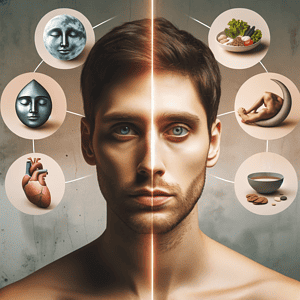Migraines are more than just severe headaches; they’re a multi-faceted neurological event with a range of debilitating symptoms. For many, the pain doesn’t end when the migraine does. A lingering fog, termed the migraine hangover or postdrome, can be equally daunting. Let’s delve deep into understanding this phase and explore potential remedies.

Part 1: Unraveling the Migraine Hangover
Understanding the Phenomenon
The migraine hangover can last anywhere from a few hours to several days. It’s marked by:
- Fatigue
- Dizziness
- Sensitivity to sensory stimuli
- Diffused body pain
- Fluctuating mood
A Glimpse Through History
Migraines have been documented for centuries, with ancient texts from Egypt, Greece, and India describing symptoms remarkably similar to what we know today. Historical figures like Julius Caesar and Saint Paul reportedly suffered from them. Over the ages, treatments ranged from herbs to drastic measures like trepanation (drilling holes in the skull). Our understanding of migraines and their aftereffects has evolved significantly, thankfully, leading to more effective and less invasive treatments.
The Science Behind the Hangover
Neurologically, migraines are a storm in the brain, involving blood vessels, neurotransmitters, and brain structures like the cortex and thalamus. The postdrome phase, similarly, isn’t just feeling ‘tired’ after a headache. It’s the brain’s recovery period, rebalancing chemicals and regaining its equilibrium.
Part 2: The Path to Potential Relief
Hydration: Not Just H2O
Significance: Dehydration can amplify migraine symptoms and delay recovery. Beyond just drinking water, understanding the role of electrolytes can be pivotal.
The Why: Hydration isn’t just about water; it’s about balance. Electrolytes like sodium, potassium, and calcium play key roles in nerve function and cellular communication.
Pro Tip: Electrolyte-rich solutions or natural sources like coconut water can aid in rapid recovery.
Restorative Power of Sleep
Significance: Sleep is the body’s repair mode. Quality, undisturbed sleep can be a potent remedy against the fatigue of a migraine hangover.
The Why: During deep sleep, cerebral spinal fluid washes over the brain, potentially clearing out toxins and waste products. It’s like a detox for the brain.
Pro Tip: Consider sleep aids like melatonin, but always consult a professional before starting any supplements.
The Dietary Connection
Significance: The gut-brain connection is increasingly recognized in medical circles. What we eat might significantly influence post-migraine recovery.
The Why: Inflammatory foods can potentially exacerbate neurological inflammation. On the other hand, certain nutrients can support brain health, making dietary choices pivotal in managing migraines and their aftermath. You can find more details on a migraine-friendly diet here.
Pro Tip: Omega-3 fatty acids, found in fish and flaxseeds, are known for their anti-inflammatory properties. They might be beneficial post-migraine.
Gentle Movements: The Middle Path
Significance: The idea is not to engage in high-intensity workouts but to adopt a balanced approach.
The Why: Movement can boost circulation, ensuring better oxygen and nutrient delivery to the brain, potentially aiding in faster recovery.
Pro Tip: Yoga, especially poses that promote inversion and increase blood flow to the head, can be beneficial.
Medicinal Avenues
Significance: While going natural is commendable, sometimes, pharmaceutical intervention becomes necessary.
The Why: Certain medications, both over-the-counter and prescription, can specifically target postdrome symptoms, offering faster relief.
Pro Tip: Always consult a healthcare professional. Also, explore specialized migraine centers for tailored advice.
Part 3: Beyond the Cure: Embracing Prevention
Migraines teach us that prevention can often be the best cure.
Understanding Migraines vs. Regular Headaches
All migraines are headaches, but not all headaches are migraines. Migraines are often unilateral (affecting one side of the head), pulsating, and can come with nausea, vomiting, and sensitivity to stimuli. Understanding this difference is pivotal in adopting the right preventive measures.
The Cutting Edge of Migraine Research
Modern medicine is continually evolving. The understanding of migraines, their triggers, and potential treatments is expanding. Current research is exploring the role of genes, the impact of modern lifestyles, and even the potential of therapies like neuromodulation in managing migraines.
The Role of Mental Health
There’s an undeniable link between migraines and mental health. Conditions like anxiety and depression can both trigger migraines and be a result of chronic migraines. Recognizing and addressing these can be pivotal in reducing migraine frequency and severity.
Expert Insights
Leading neurologists emphasize the importance of understanding personal triggers. It could be dietary, environmental, or hormonal. Recognizing and managing these can lead to significant reductions in migraine occurrences.
Wrapping Up
The journey with migraines is personal and often arduous. The postdrome phase, the migraine hangover, can be a challenging period, but understanding and adopting a multi-pronged approach to management can offer substantial relief. Remember, the quest is not just about finding a cure but also about understanding and prevention. Armed with knowledge and the right strategies, one can navigate the maze of migraines with greater ease and confidence.
